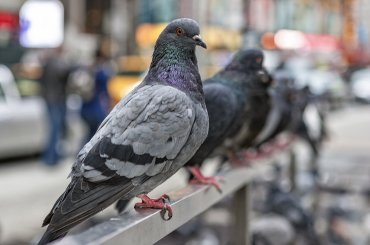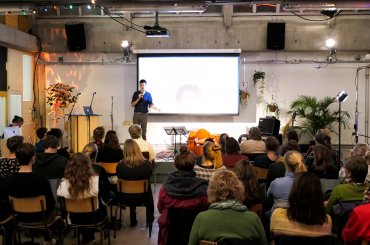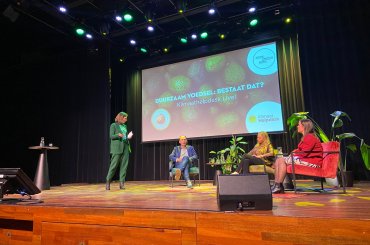Close-up #2
Inspiring columns, background stories and experiences of researchers and support staff: this magazine shows the connection between public and science at Utrecht University. Let the stories in this magazine inspire you, develop your own ideas and look for the right partners to put them into practice.
Foreword
Engaging a broad audience in science involves organising encounters. Precisely this has been a challenge in the past two pandemic years. Some programmes involving partners at the university and elsewhere had to be postponed until better days. On the other hand, we discovered just how flexible we could be.
The university sees ever more opportunities for inspiring encounters between science and society, made possible by cooperation.

Behind the scenes: Science Weekend
Science Weekend is a national event in the first weekend of October, in which knowledge institutions offer a peek behind the scenes in the world of science and technology. Utrecht University participates every year.

Column dr. Marij Swinkels
Together with a group of enthusiastic colleagues, the Public Engagement Fellows of the Open Science Programme, I reflect on public engagement with research and education.
Science with and for society
Being appointed Professor of Oceanography and Public Engagement at the end of 2021 was a dream come true for Erik van Sebille. Not only can he now study the workings of science communication, he was finally able to participate in Meet the Professor. How important is it to have a Professor of Public Engagement, and what will he be working on this year? We picked Erik’s academic brain.
Science communication is not about conveying the facts, but about an understanding of how science works.

A look at... counting pigeons for science
VMBO, HAVO and VWO students can use the digital curriculum Focus on Human-Animal Relations (Relatie mens & dier in het vizier) by Utrecht University Museum (UMU) to contribute to real scientific research.

Close-up: Utrecht Day of Philosophy
Are you responsible for your own prejudices? And how do we experience beauty? On the Utrecht Day of Philosophy (Utrechtse Dag van de Filosofie), the public and philosophers studied the world around us.
Facts and figures
A collection of facts and figures on various public activities and initiatives at Utrecht University.
Route to impact measurement
A helpful guide to the steps you need to take to create a good measurement plan.
In practice: making time for public engagement activities
It can be a challenge to find the time to engage in public activities in addition to one’s research and teaching tasks. We asked three Utrecht University staff with practical experience for their perspectives. "We, the researchers, can solve a lot of things ourselves, and we’re creative when it comes to this. However, you don’t just want university solutions at the level of the individual researcher. You want solutions at a higher level as well."

In practice: keeping quiet is not an option
Marc Bonten enjoys discussing science. During the pandemic, he dealt selectively with the many media requests he received. He takes his academic responsibility to provide guidance seriously.

A look at... Working together by going down unexpected paths
The Centre for Unusual Collaborations (CUCo) enables young researchers to do interdisciplinary research that can make a positive contribution to social issues.
It’s often enjoyable, it keeps you on your toes and you meet people who know more about a specific subject. This helps you ahead in your own research.

A look at... A word about tomorrow
Scientific research starts with questions. With this in mind, in October 2021 the Centre for Science and Culture organised A word about tomorrow, a low-threshold programme in seven district libraries in Utrecht.

In practice: Vechtclub and science, a good match!
Vechtclub is a creative incubator that has started a collaboration with Utrecht University. The series of programmes Creativity Dissected addresses the questions of what creativity is, what its value is and how it can be used.

Behind the scenes: Climate Helpdesk
It’s not easy to find reliable information these days. To address this, the Climate Helpdesk was set up two years ago: the go-to place for anyone looking for a science-based answer to climate questions.
A look at... Debut
Programme maker Lieke Dekker works with media creators Tobias Mathijsen and Roshni Dokkum to create short videos in which researchers describe the personal paths that led them to science.
Double interview: Competing interests, successful cooperation
Utrecht University conducts research using laboratory animals, which the organisation Animal Rights opposes on principle. Even so, they’ve cooperated successfully for years. Monique Janssens (Utrecht University) and Jen Hochmuth (Animal Rights) talk about the cooperation, in which mutual trust is key.
At first, researchers shy away from conversations with animals rights organisations

Close-up: Botanic Gardens
Everyone who is interested in plants and nature is welcome to visit Utrecht University’s Botanic Gardens. They’re also a location for teaching and research, such as biodiversity research on a large scale.

A look at... UMU's Fossil Hunt
Working with Prof. Jelle Reumer, Lore Smit and her colleagues devised a family-oriented audio tour of fossils in the city centre. To date, about 400 families have participated in the Fossil Hunt.
Being open involves being vulnerable
“So, how are you doing?” my colleague asked me one Friday afternoon in the university library. Two weeks earlier, I’d delivered a lecture on ‘Life in the here and now?’ at Studium Generale in the auditorium of the University Hall, and before that I’d appeared on the radio programme ‘De Nacht van NPO Radio1’. My research is about the experience of time. I convert some of my findings into compositions, and I use this music to have conversations about psychological suffering. It was during these public appearances that I first tested, on a large scale, a new treatment ritual involving the audience. It was very successful, but in the office, I burst out in tears.
This, too, forms part of open science: paying attention to people and their stories.

Close-up: UUnited Music Festival
The UUnited Music festival held on 24 March 2022 was an explosion of creative energy. The Utrecht student choirs and orchestras, composed of 450 students of Utrecht University, gave a performance at TivoliVredenburg.

A look at... Green Challenge
In the autumn of 2021, Studium Generale organised the Green Challenge. Throughout November, participants opened a little online door every day, revealing a sustainability challenge on different themes.

